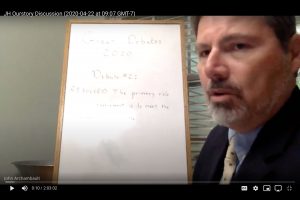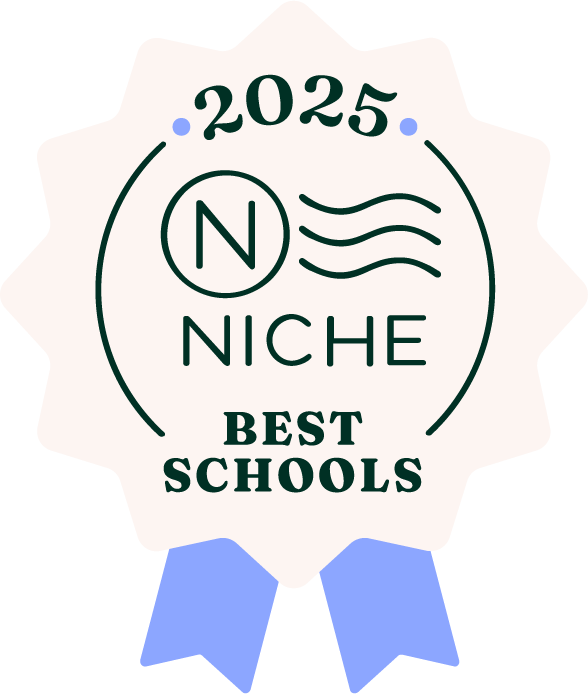As they do every spring, Greensboro Montessori School's Junior High students recently engaged in their final Great Debate of the year in history. Students addressed and argued both sides of two debates. The first questioned whether the purposes of government are best served by an authoritarian approach. The second questioned whether the primary role of a government should be to meet the needs of its people. The debates provide Junior High students the opportunity to argue in a logical and clearly defined manner.
 While The Great Debates are usually hosted in the classroom, this year's final debates were argued virtually through Google Hangouts. 57 participants, including students from both Junior High and Upper Elementary, attended the event, deepening their understanding of many forms of government and economic systems, including authoritarian, capitalist, communist, and socialist.
While The Great Debates are usually hosted in the classroom, this year's final debates were argued virtually through Google Hangouts. 57 participants, including students from both Junior High and Upper Elementary, attended the event, deepening their understanding of many forms of government and economic systems, including authoritarian, capitalist, communist, and socialist.
How the Debates Work
Teams of two or three students are given their topic in advance, but they do not learn which side they are on, for or against, until the morning of the debate. As a result, they must analyze and evaluate both sides and research and compile points and examples supporting both arguments. Each student writes two formal position papers, one for each side of the argument. This helps them broaden their thinking and mental flexibility.
 The debates follow a modified version of standard debate procedure, with an opening argument, sometimes shared by two teammates; time for preparation of rebuttal; and then closing arguments and rebuttal, by the remaining member of the team. Faculty members observe, discuss and provide extensive oral feedback to the teams about the debate.
The debates follow a modified version of standard debate procedure, with an opening argument, sometimes shared by two teammates; time for preparation of rebuttal; and then closing arguments and rebuttal, by the remaining member of the team. Faculty members observe, discuss and provide extensive oral feedback to the teams about the debate.
How Topics are Selected
The topics of the debates are drawn from subject matter the students have discussed in history classes during the preceding several weeks. Students are encouraged to go beyond the class discussions in gathering information and building their arguments.
The process allows students to go beyond what they have learned and apply it to larger questions, to develop their reasoning and ability to build and support logical arguments, and to gain confidence and develop greater precision in presenting their thoughts persuasively.
How We Learn
As Junior High students move into and through adolescence, it’s imperative they receive authentic support for their burgeoning philosophical questioning, curiosity in the world around them, and deep desire for belonging within their peer group. Greensboro Montessori School honors these needs through the concept of valorization, which is a pillar of our Junior High curriculum.
Valorization is the process of understanding you are a strong and worthy person. It is the process of self-actualization and fulfillment. It is not about surviving hours of arbitrary homework or memorizing facts for the next test. It’s about completing meaningful work, unleashing academic excellence, and solving real-world problems.
The Great Debates are just one example of how Greensboro Montessori School students experience valorization by developing self-worth, skills, and courage through purpose-filled work. Learn more about how we build valorization through our science curriculum in our recent blog about Trout in the (Indoor, Outdoor, and Virtual) Classroom.
If you are interested in learning more about Greensboro Montessori School's student-centered Upper School serving motivated learners in fourth to ninth grades, we encourage you to schedule a virtual information session. We welcome an opportunity to meet you, learn more about your family, and explore Greensboro Montessori School could partner with your family.


